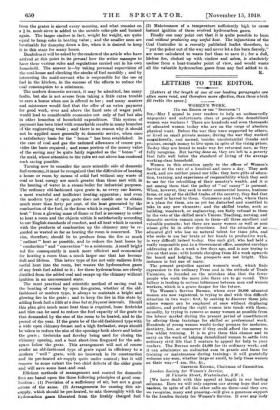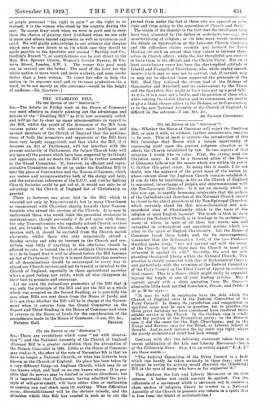LETTERS TO THE EDITOR.
[Letters of the length of one of our leading paragraphs are often more read, and therefore more effective, than those which
Jill treble the space.] --- WOMEN'S WORK.
[To THE EDITOR OF THE " SPECTATOR."] Sirt,—May I appeal to your readers to help an undeservedly unpopular and unfortunate class of people—the demobilized women war workers ? There are hundreds and even thousands of educated women to-day who are on the verge of absolute physical want. Before the war they were supported by others, or lived on small private means; during the war they worked magnificently, and earned, besides unsubstantial thanks and praises, enough money to live upon in spite of the rising prices. To-day they are bound to make way for returned men, as they fully recognize. But having done so, they are left to a poverty that falls well below the standard •øf living of the average working-class household.
Women in this situation apply to the offices of Women's Service at the rate of a hundred and more a day. They seek work, and are neither proud nor idle.: they have gifts of educa- tion, training, and experience of responsibility which they seek to use for the rebuilding of their country's wealth, and it is not among them that the policy of "ca' canny" is pursued. When, however, they seek to enter commercial houses, business firms, or any of the skilled trades of the country, they find that the road is barred to them. Commerce and trade, where there is a plate for them, are as yet too disturbed and unsettled to take in any new elements : and the skilled trades, -such as building, woodwork, or engineering, are flatly refused to them by the veto of the skilled men's Unions. Teaching, nursing, and domestic service remain open to them—all three excellent and valuable pursuits; but there are many women as well as men whose gifts lie in other directions. And the situation of an educated girl who has no natural talent for these jobs, and who seeks to use her brain or her hands in productive work, is very difficult indeed to-day. One such girl, who had held a really responsible post in a Government office, accented envelope addressing at 25s. a week a few days ago, and is now trying to live on that sum; with hostels charging from £2 a week upwards for board and lodging, the prospects 'are not bright. This instance is but one of many.
The present prejudice against women's work, which finds expression in the ordinary Press and in the attitude of Trade Unionists, is founded on the mistaken idea that the fewer people who work the more jobs there are to go round. This fallacy is leading to serious bitterness between men and women workers, which is a grave danger for the future.
The Women's Service Bureau, where over 29,000 educated women are now registered, is trying to deal with this difficult situation in two ways: first, by seeking to discover those jobs where women can be employed at once without displacing soldiers, and putting the right women into touch with them; secondly, by trying to remove as many women as possible from the labour market during the present period of unsettlement by offering them trainings for skilled or professional work. Hundreds of young women would to-day prepare for medicine, dentistry, law, or commerce if they could afford the money to live whilst training. It is to give them this chance and to carry on the work of helping demobilized women to settle into ordinary civil life that I venture to appeal for help to your readers. The Bureau needs 24,000 for its ordinary work; and it can administer an unlimited sum in grants and loans for training or maintenance during training : it will gratefully welcome any sum, whether large or small, to help these women on their way.—I am, Sir, &e., GERTRUDE KINNELL, Chairman of Committee.
London Society for Women's Service, 58 Victoria Street, Westminster, S.W
[We have dealt with this appeal at length in our leading columns. Here we will only express our strong hope that our readers, in spite of all the other calls on them—and they are, we recognize, many and pressing—will give a generous support to the London Society for Women's Service. If ever any body of people possessed "the right to earn" or the right to be trained, it is the women who stood by the country during the war. To accept their work when we were in peril and to deny them the chance of gaining their livelihood when we are safe is mean and odious beyond expression as well as tyrannous and cruel. We will gladly acknowledge in our columns any cheques which may be sent direct to us (in which case they should be made payable to the Spectator and crossed "Barclay and Co., Gosling's Branch "), or contributions can be sent direct to the Hon. Mrs. Spencer Graves, Women's Service Bureau, 58 Vic- toria Street, London, S.W. 1. The sooner this good work can be carried out the better. The need of the hour for the whole nation is more work and more workers, and none works better than a keen woman. To reject her offer to help the nation in its supreme need and to increase production—in a word, to be not merely an idle consumer—would be the height of madness.—En. Spectator.]







































 Previous page
Previous page